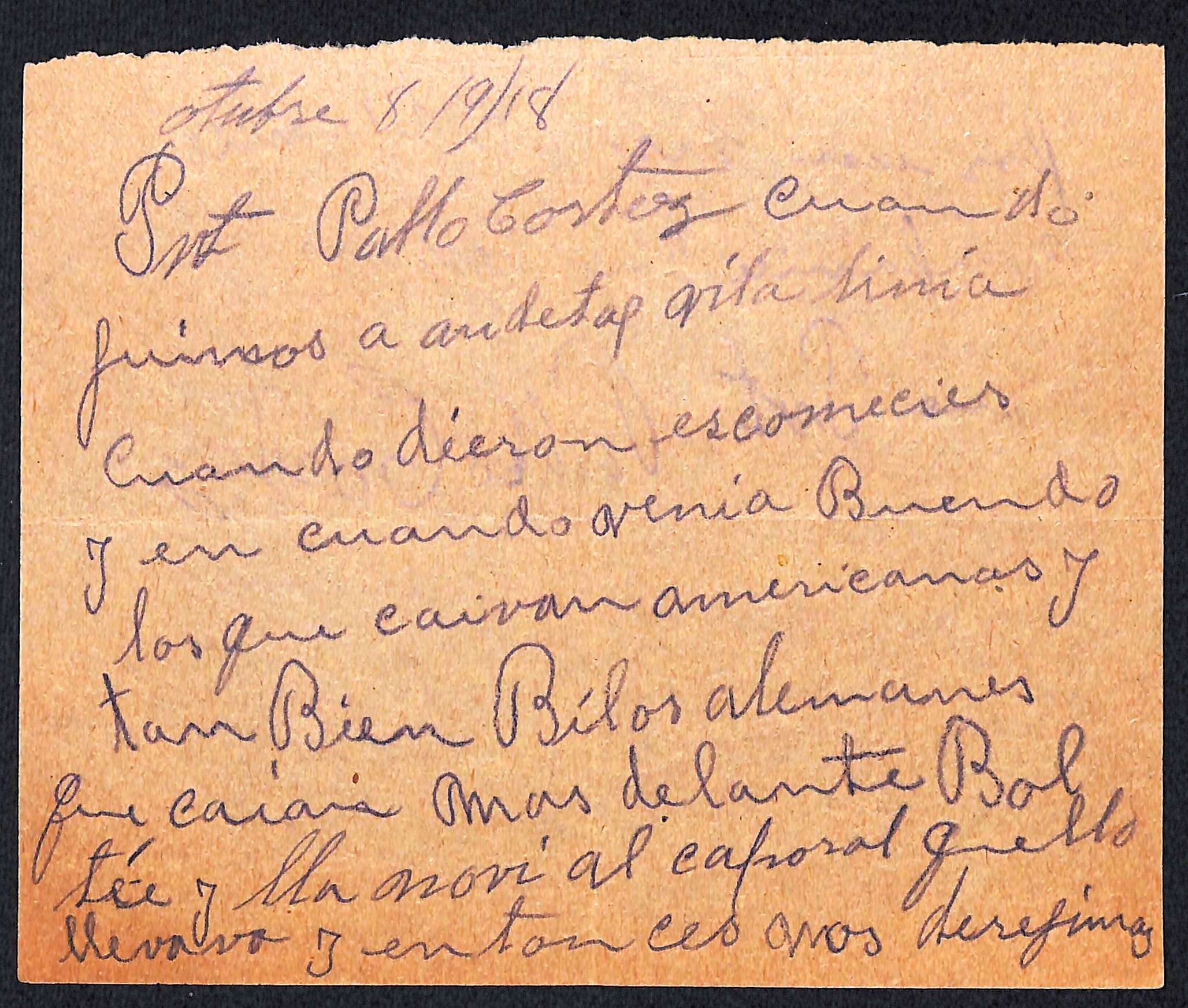WWI Experience of Pablo Cortez
1918
Add to Favorites:
Add all page(s) of this document to activity:

Add only page 1 to activity:
Add only page 2 to activity:
In this eyewitness account, Private Pablo Cortez, of Company M, 141st Infantry, described his experience at the front.
War Department rules required soldiers to read or write English in order to serve. The War Department created the Foreign-speaking Soldier Subsection (FSS) in January of 1918 to quickly teach recruits basic English and engage in Americanization programs. Most soldiers only received three months of training, resulting in many achieving only functional literacy.
Private Cortez combines broken Spanish and some phonetic English in his account. An English translation reads:
War Department rules required soldiers to read or write English in order to serve. The War Department created the Foreign-speaking Soldier Subsection (FSS) in January of 1918 to quickly teach recruits basic English and engage in Americanization programs. Most soldiers only received three months of training, resulting in many achieving only functional literacy.
Private Cortez combines broken Spanish and some phonetic English in his account. An English translation reads:
October 8, 1918This document comes from a collection of "Personal War Experiences" that WWI servicemen were asked to write after their return from the front during the Meuse-Argonne Offensive. The men were personnel of the 36th Division – known as the Lone Star Division, formed from the Texas and Oklahoma National Guard – of the American Expeditionary Forces (AEF).
Pvt. Pablo Cortez when we went over the top. When they gave us [escomecies?] - and then when I started seeing that the Americans fell and also saw the Germans that fell. Further, I turned and no longer saw the corporal who I carried [llevaba?] ) and so we headed for a Sergeant of the same company.
End. This is everything [I saw]. Pvt Pablo Cortez
Transcript
[Spanish transcription]Otubre 8 1918 [Octubre]
Pvt. Pablo Cortez cuando fuimos a andetap [on the top] aríba Simia [arriba Encima?]
cuando dieron escomecies [?] y en cuando venia Buendo (viniendo) los que caivan [caian]
americanos y tan Bien Bílos (vi los) alemanes que caían Mas delante Boltie [voltié?] y lla [ya]
no vi al caporal [corporal in English] quello [que yo] llevava [llevaba?] y entonces mas derejira
[dirijíra], por un Sargento dela [de la] mis [misma] compania fines estodo [ es todo]
lo que [blank - paso?] Pvt Pablo Cortez
[English translation]
October 8, 1918
Pvt. Pablo Cortez when we went over the top. When they gave us [escomecies?] - and then when I started seeing that the Americans fell and also saw the Germans that fell. Further, I turned and no longer saw the corporal who I carried [llevaba?] ) and so we headed for a Sergeant of the same company.
End. This is everything [I saw]. Pvt Pablo Cortez
This primary source comes from the Records of the American Expeditionary Forces (World War I).
National Archives Identifier: 77419692
Full Citation: Personal Experience of World War I from Pablo Cortez; 1918; Cortez Pablo Pvt. [141st Inf.?] 36th Division 1918, 236.33.61; Records of Divisions, 1917 - 1920; Records of the American Expeditionary Forces (World War I), Record Group 120; National Archives at College Park, College Park, MD. [Online Version, https://docsteach.org/documents/document/wwi-cortez, May 1, 2024]Rights: Public Domain, Free of Known Copyright Restrictions. Learn more on our privacy and legal page.





